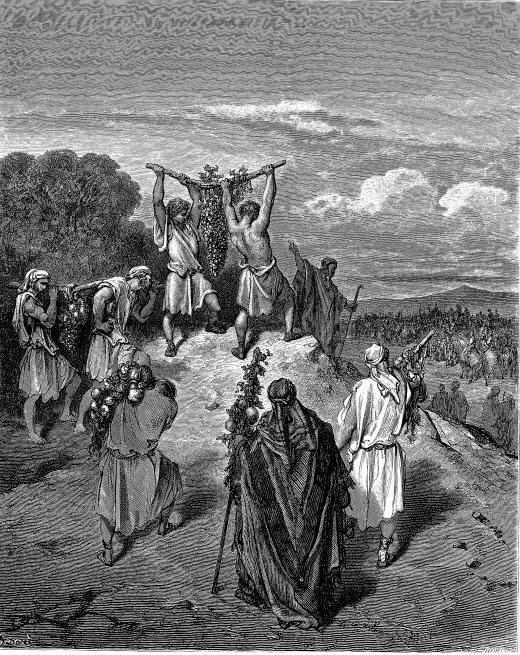“This is why you had to stay in Kadesh as long as you did.” (Deuteronomy 1:46, CJB)
It would be cruel to allow an eight-year-old, Grade two pupil to enroll in the university, get a course in Nuclear Physics and delve into atoms, electrons, neutrons, positrons, neutrinos, theory of relativity, M-theory, quantum fields, etc.
No crayons, no playgrounds, no trips to the zoo or to the children’s library. And definitely no licking lollipops during lab sessions in inorganic chemistry!
This pupil will not be able to cope with the demands of research, laboratory experiments, assignments, lessons and overall demands of college life. This kid would wish he’d never been born.
In the same way, it would be cruel if God allows someone to receive great blessings if those very blessings will destroy him. It makes sense to qualify first before allowing you to enter your promised land.
God in His goodness will never set you up for failure. In Him is a good fight of faith. It is a good fight because God already knew you will win by the His grace. Passing your tests then are absolutely necessary before you can rise to the next level of blessings or usefulness in God’s Kingdom.
For two years in the desert since the crossing of the Red Sea, the Lord led them to difficult situations to test them. They scored zero in all their tests! You can almost feel God’s heartbreak. Two years of constant nurturing yielded no fruit.
Number 14:22-23
“None of the people who saw my glory and the signs I did in Egypt and in the desert, yet tested me these ten times and did not listen to my voice, will see the land I swore to their ancestors! None of those who treated me with contempt will see it.”
Here are the ten hindrances to your fullness of blessings: (Adapted from Dr. Brian Bailey’s book The Journey of Israel, 2002, pages 264-266)
1. Opposition from the world (Exodus 14:11-14)
These are worldly temptations and seductions that lure you back to the world and its ways. A great part of it is persecution from ungodly people - your loved ones, too. (2 Timothy 3:12)
When you announce to your family that you are now born again, they may jeer and say either you are just joking, it’s just a fad or you’ll only last three months. They honestly think you will go back to your old habits. If you go beyond three months, they would say you are taking these religious stuff too seriously you might lose your mind.
Even your ungodly friends persuade you to stop your “religious” madness because you might pass beyond heaven for being too godly. They most likely say this to ease their own conscience. When believers get serious in their walk with God, unbelievers take notice and they become uneasy. Now, they need to see their sinful lives in light of God’s righteousness. For the ungodly, it’s easier to throw mud at somebody who just got cleaned up than admit their own dirty lives.
If you follow Jesus, know that persecution will come your way. Take heart, Go will strengthen you. Satan will throw great temptations to lure you back to the bondage of sin. Take heart, God will provide a way of escape.
“The temptations in your life are no different from what others experience. And God is faithful. He will not allow the temptation to be more than you can stand. When you are tempted, he will show you a way out so that you can endure.” (! Corinthians 10:13, NLT)
Either way, you must take a firm stand for our Lord Jesus Christ. There is no middle ground. You cannot participate in the sinful lifestyle of your ungodly friends and win God’s approval at the same time. We are in the world but we are not of the world. We lovingly win our friends to the Lord, but we need to take care not to participate in their sins.
Pharaoh and all his army chased the Israelites all the way to the Red Sea to enslave them again. God gave a directive to them “never to go back that way again.” (Deuteronomy 17:16, CJB)
Egypt is a type of the world and bondage to ungodliness. God wants us to walk holy and keep on growing in His righteousness. Make a firm stand for Jesus Christ and never go back to your dirty ways again.
2. Bitter Waters (Exodus 15:22-27)
Bitter waters refer to bitter experiences. After three days of crossing the Red Sea, they came to a wadi of water. They started drinking but the water was bitter. They grumbled and said, “What are we to drink?” (Exodus 15:24)
Christians go through bitter experiences and disappointments.
To extract the precious essential oils of flowers used in making perfume, the flowers goes through steam distillation whereby the heat of the steam breaks the cellular structure of the flowers and releases the precious fragrances.
When we embrace bitter experiences with Christlike attitude, they will produce in us a sweetness and graciousness in our spirits. Our character becomes fragrant with Christlikeness. Sadly, there are those who remain bitter after the experience.
In the narrative of the Israelites, God instructed Moses to cut a particular wood and throw it in the water. The water became sweet and drinkable. We overcome bitter experiences by taking them to the cross of Christ. As you surrender your heart to the Lord, He will give you the ability to manifest grace even while under pressure.
3. Hunger (Exodus 16:1-12)
Hunger speaks not only of physical hunger but also of economic trials. Dr. Brian Bailey says, These are “times when we do not have enough money or the things that we really want.” This may refer to material needs or financial pressures.
“The people of Israel said to them, ‘We wish Adonai had used his own hand to kill us off in Egypt! There we used to sit around the pots with the meat boiling, and we had as much food as we wanted. But you have taken us out into this desert to let this whole assembly starve to death!” (Exodus 16:3)
Was this true? They were the lowest of slaves in Egypt was it not? They did not have as much food as they wanted. Or else they would not have called on the Lord to save them from extreme slavery.
In life, we will experience periods where we don not get what we want or there is not enough. These seasons challenges us to exercise our faith and dependence on God.
4. Thirst (Exodus 17:1-7)
According to Dr. Bailey, these are dry and boring experiences. Exodus 17:1-7
“The people quarreled with Moshe, demanding, ‘Give us water to drink!’ But Moshe replied, ‘Why pick a fight with me? Why are you testing Adonai? However, the people were thirsty for water there and grumbled against Moshe, ‘For what did you bring us from Egypt? To kill us, our children and our livestock with thirst?’… ‘The place was named Massah [testing] and M’rivah [quarreling] because of the quarreling of the people of Isra’el and because they tested Adonai by asking, ‘Is Adonai with us or not?’” (Exodus 17:2-3,7, CJB)
It is when we go through dull and mundane seasons we are called to exercise faithfulness more than ever. It’s easy to slack but God challenges us to heighten up our spiritual disciplines. Keep on reading and meditating your bible, keep on praying, keep on obeying the Lord, keep on doing good. For in due time you will reap a good harvest if you do not give up. (Galatians 6:9)
5. Idolatry (Exodus 32)
An idol is anything that replaces your love toward God. It steals your heart away from God.
Aaron made a scathing remarks on the Israelites, “You know what these people are like, that they are determined to do evil. So they said to me, ‘Make us gods to go ahead of us; because this Moshe, the man that brought us up from the land of Egypt- We don’t know what has become of him.’ I answered them, ‘Anyone with gold, strip it off!’ So they gave it to me. I threw it in the fire, and out came this calf!’” (Exodus 32:22-24, CJB)
Idols are cheap substitutes for God. Idols cheat those who honors them. Idols promises good things but they do not live up to their promise. For instance, when you love your gadgets more than you love God, you will have fun for a while but later on you will feel empty inside. Then those gadgets will call for more gadgets, fooling you into thinking that more of them will make you happier. But then again, you still feel dissatisfied. How much gadgets do you need to be happy? When you allow these to “use” you, you will never be happy. Electronic gadgets are good when you rule over them and not them ruling over you.
Stay away from anything that cools down your love for God, anything that steals your heart away from Him or anything that distracts you from a pure and simple love-relationship with the Lord.
6. Complaining
Dr. Brian Bailey says, “[They] constantly complained about their circumstances. Complaining causes us not to find favor with God. Philippians 2:14 says, “Do everything without complaining or arguing.” (NIV)
Complaining has deadly consequences: “But the people began complaining about their hardships to Adonai. When Adonai heard it, his anger flared up, so that fire from Adonai broke out against them and consumed the outskirts of the camp.” (Numbers 11:1, CJB) Complainers never get what they want. They will crave for a good life but it will never come. Instead they will always run into trouble, arguing, fighting for their “rights.” Like the sensation of burning, they will experience “searing situations.” They are uncomfortable, uneasy and hard to live with.
7. Unthankfulness
“The children of Israel never learned to give thanks to God. They were unthankful for the manna He provided for them; they wanted quails. Unthankfulness is one of the first steps to backsliding.” (Journey of Israel, Dr. Brian Bailey)
1 Thessalonians 5:18 says, “In everything give thanks; for this is the will of God in Christ Jesus for you.” When we run into difficulties, we need to recognize what God is up to. When we see God’s hand, thankfulness will naturally spring from our hearts. Why, we know that “all things work together for good to those who love Him and are called according to His purpose.” (Romans 8:28)
There are no accidents in the Kingdom of God. Things just didn’t happen. Everything has a purpose and a plan. Things did not happen by chance. The enemy may have a hand in your troubles right now, but God will have the upper hand. This will give occasion for His miracles to work in your life.
When we give thanks even in troublesome times, we declare our trust that God is in control of everything. And He is definitely in control.
The unthankful, however, will never see God’s hand at work. This person will miss the opportunity to see God’s glory at work in his own life. Learn to count your blessings and practice thanking God in everything. You will realize that God has been actively working in all aspects of your life. How great is the love of God towards us who believe!
8. Gluttony
Dr. Bailey defines this as “lust for food, and every other kind of excessive desire.”

God wants us to exercise discipline. Self-control helps you stay on track, keeps your desires in check, and helps you keep your eyes on the goal.
Gluttony is craving for more than what you need. This may lead to unhealthy and destructive addictions.
9. Criticism
Even Aaron and Miriam criticized Moses. (Numbers 12:1-2) Miriam never made it to the promised land.
Ungodly criticism does not build up. It tears apart and does not strengthen ties. Criticism on your leaders attacks God because He placed those leaders over you. (Romans 13:1-2) So, God takes it personally when you dishonor your leaders in this way.
10. Unbelief
Dr. Bailey tells that “the ten spies infected the whole congregation with fear and unbelief.”
Unbelief is distrusting God. It refuses to believe God and His good promises. It questions God’s goodness.
For the Israelites, it struck God at the heart because the people who were supposed to uphold His covenants, believe in Him and obey His commandments, were the very same people who disowned Him. He came to His own but His own did not believe Him. (John 1:11)
“None of those who treated me with contempt will see it.” (Numbers 14:23, CJB) You may be tempted to think that God was being capricious. This is not the case. The Israelites came to the point where they became hopeless. They just don’t want God to rule over them. They don’t want to trust Him. They want to their own thing. And they wanted to use God for their own pleasures.
They constantly demanded their “rights.” And when they got it, they acted like a spoiled brat. When God corrected them for their wrongs, they complained and rebelled.
When they fell into unbelief, that was beyond hope. They will never believe whatever God says. The only thing left to do is to just let them die. What a scary thing to be in! May the Lord have mercy on us.
These ten hindrances to your blessings are like warnings. They tell you to stay away from what poisons your character. Imagine if there were no warning signs. No stop signs at intersections and cars charge ahead; no warning labels on insect sprays and sprays it on your food; no warning signs like dead end - bridge out and you keep driving on. But when the warnings are up there, it would be foolish to ignore them.
God wants us to enjoy His blessings to the fullest. The ten hindrances above spoil the fun. It is for freedom that Christ has set us free. Stand firm, then, and do not let yourselves be burdened again by a yoke of slavery. (Galatians 5:1, NIV)
“Every trial should be a steppingstone to greater heights in God. However, because the children of Israel failed in their tests, the tests became stumbling-blocks that hindered them from moving on with God. Therefore, we must seek to pass the trials and tests that we experience so that we will succeed in life.” (The Journey of Israel, page 264)



















